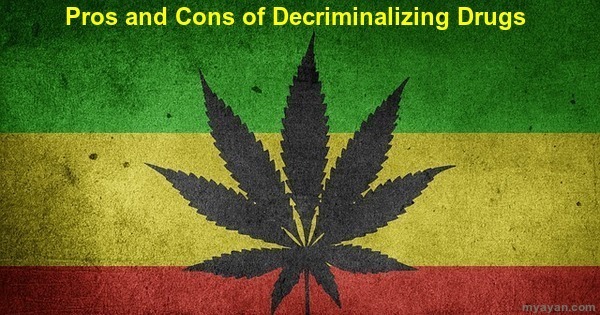Drug abuse is a growing problem in developed countries and youth is highly prone to it. In response to curb the issue, some governments have proposed decriminalizing certain drugs to control addiction and substance abuse. But drug decriminalization has sparked much debate across the globe. With many people struggling with addiction rising, some question whether the step could be a potential solution. But while decriminalization might seem like a simple solution, it's a complex issue. That’s why you should look at the pros and cons of decriminalizing drugs from both perspectives.
As per the National Institute on Drug Abuse (NIDA), about 65% of prisoners in the US struggle with drug addiction, aka, substance use disorder. Sadly, the majority of these individuals do not receive sufficient addiction treatment during their time behind bars. That who the pros of decriminalizing drugs will be accounted for, as per experts. Some of the advantages of decriminalizing drugs include:
One of the most significant benefits of decriminalization is that it could reduce stigma. By removing the legal consequences of drug use, more people may feel comfortable seeking help for their addiction. Currently, many individuals think that they are unable to overcome their addiction since drug use is frowned upon and criminalized. Decriminalization would free individuals from fear of punishment for drug use and make it easier to seek the help they need.
Decriminalization could have tremendous benefits regarding the number of incarcerated people for drug-related offences. Prisons are often overcrowded, and many view drug convictions disproportionately targeting people of colour. By removing the potential for imprisonment, there may be a reduction in inequality and bias within the criminal justice system.
With decriminalization, there is an opportunity to regulate drug use and quality. Individuals could access clean and safe drugs, reducing transmission of diseases like HIV and Hepatitis C. Moreover, controlling drugs would reduce the number of overdoses caused by an unknown or contaminated substance.
Decriminalization could provide a significant source of taxable revenue. By removing the underground market, governments could tax drug sales and use the money to fund public health programs or other initiatives that could benefit society.
With decriminalization comes a reduced financial burden on the criminal justice system. Much of the money spent on law enforcement and imprisonment is related to drug offences. By eliminating these costs, more resources could become available for other initiatives, such as education or prevention programs.
Some individuals resist drug policy reform, expressing concerns about the potential consequences of removing criminal penalties for drug offences. One of the most worrying cons of decriminalizing drugs is that such a change would increase the likelihood of drug experimentation. Decriminalization could backfire in many different ways.
Decriminalization could lead to increased drug use since there would be less of a deterrent to using drugs. Without the threat of criminal punishment, some individuals may feel it's safe to experiment with drugs, which could lead to addiction or other health issues.
The potential for increased drug use could significantly influence children and teenagers. Without the fear of criminal punishment, younger individuals may be tempted to experiment with drugs, leading to long-term health implications.
While decriminalization might reduce some underground markets, it would create new opportunities for drug trafficking and organized crime. With fewer legal consequences for drug-related crimes, there is potential for drug gangs to flourish and create an even larger criminal underworld.
Decriminalization could lead to higher addiction rates, as individuals may be more inclined to misuse drugs, given the lack of punishment or associated stigma. As a result, people may become trapped in a cycle of addiction, leading to more severe health complications.
The decriminalization of drugs could be seen as a violation of the 1961 UN Single Convention on Narcotic Drugs. Decriminalization would go against the conventions established in that treaty, leading to conflicts with other nations and potential sanctions for countries who do choose to decriminalize drugs.
After exploring the various pros and cons of decriminalizing drugs, it is clear that the issue needs a rigorous examination of its different societal implications. While some consider medicine use a personal matter and argue that individuals should not be criminalized for personal choices, others assert that decriminalization could lead to adverse outcomes. As we continue having this debate, it is essential to recognize the real-world consequences of legislating around drug policy both locally and nationally.
Our collective responsibility as citizens is to stay informed on these issues and understand how trends in drug policy affect our environment, economy, and broader society. If you have any questions about the process or want to advocate for change, please get in touch with your local legislators and community groups impacting this space.

The drugs slated for decriminalization encompass opioids (such as heroin and fentanyl), cocaine (in powder or crack form), methamphetamines, and MDMA (commonly known as ecstasy). It is important to note that decriminalization should not be confused with legalization, as the two concepts hold distinct meanings.
Decriminalization entails eliminating the criminal offense associated with personal drug possession. Various decriminalization models are employed in different jurisdictions, such as those utilizing administrative penalties, fines, or involuntary treatment as alternatives to criminalization. This approach aims to enhance the writing quality, optimize word choice, and improve structure, readability, and eloquence while preserving the original meaning.
Decriminalization has several potential benefits, such as diverting people from the criminal justice system and toward health-oriented interventions. This could significantly reduce overcrowding in correctional facilities strained due to drug-related offenses.
There is no evidence to suggest that decriminalization leads to higher rates of substance abuse. Research conducted in Portugal has shown that since they adopted a decriminalization approach for personal possession and use of small amounts of drugs in 2001, there was no surge in drug-related problems or crime.